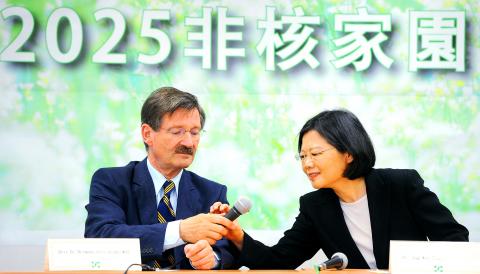|
Tsai talks energy
with Germans
ENCOURAGEMENT: The DPP presidential candidate
said Germany’s commitment to developing a green-energy sector over the past
decade was encouraging for Taiwan
By Vincent Y. Chao / Staff Reporter

Democratic Progressive Party
Chairperson Tsai Ing-wen, right, helps German Bundestag Vice President Hermann
Otto Solms turn on his microphone prior to his speech during a meeting in Taipei
yesterday.
Photo: Wang Min-wei, Taipei Times
Democratic Progressive Party (DPP)
Chairperson and presidential candidate Tsai Ing-wen (蔡英文) yesterday comparerd
her plan to phase out nuclear energy with a similar decision by the German
government when speaking to a visiting delegation from Berlin.
“Germany’s announcement that it will close all its nuclear power plants by 2022
is a very ambitious and brave plan. It’s not only a political declaration, but
evidently one that has taken a lot of thought,” Tsai told the visiting German
lawmakers.
Tsai, who recently returned from Germany, has trumpeted her “2025 nuclear-free
homeland” plan, which aims to gradually shut down Taiwan’s three existing
nuclear power plants and stall operations at a fourth, currently under
construction in New Taipei City (新北市).
As part of her plan, Tsai has called on the nation to substantially increase its
share of sustainable energy, as well as increasing efficiency at coal-fired
plants currently in operation and building new natural gas plants if needed.
Yesterday’s meeting with the German delegation, which was led by Bundestag Vice
President Hermann Otto Solms, was focused on issues relating to future energy
policies, DPP officials said.
Tsai told Solms at the beginning of the closed-door meeting that Germany’s
green-energy policy during the past decade has given Taiwan “deep encouragement”
and that learning from Germany’s experience would allow Taiwan to catch up in
the shortest possible time.
“The DPP hopes that after winning the elections next year, we can successfully
embark on a new chapter in the creation of a nuclear-free homeland that will
define Taiwan,” she said.
Solms said phasing out the nuclear industry would require large-scale
investments in alternative forms of energy.
“The German Bundestag will pass the law to phase out nuclear power in the end of
June to allow corporations to have the legal basis and protections to begin
investments into renewable energies,” he said.
“We hope that by 2022, sustainable sources [of energy] will account for 35
percent of Germany’s energy production and that the nuclear-free target can be
successfully completed,” Solms added.
|
![]()
![]()
![]()